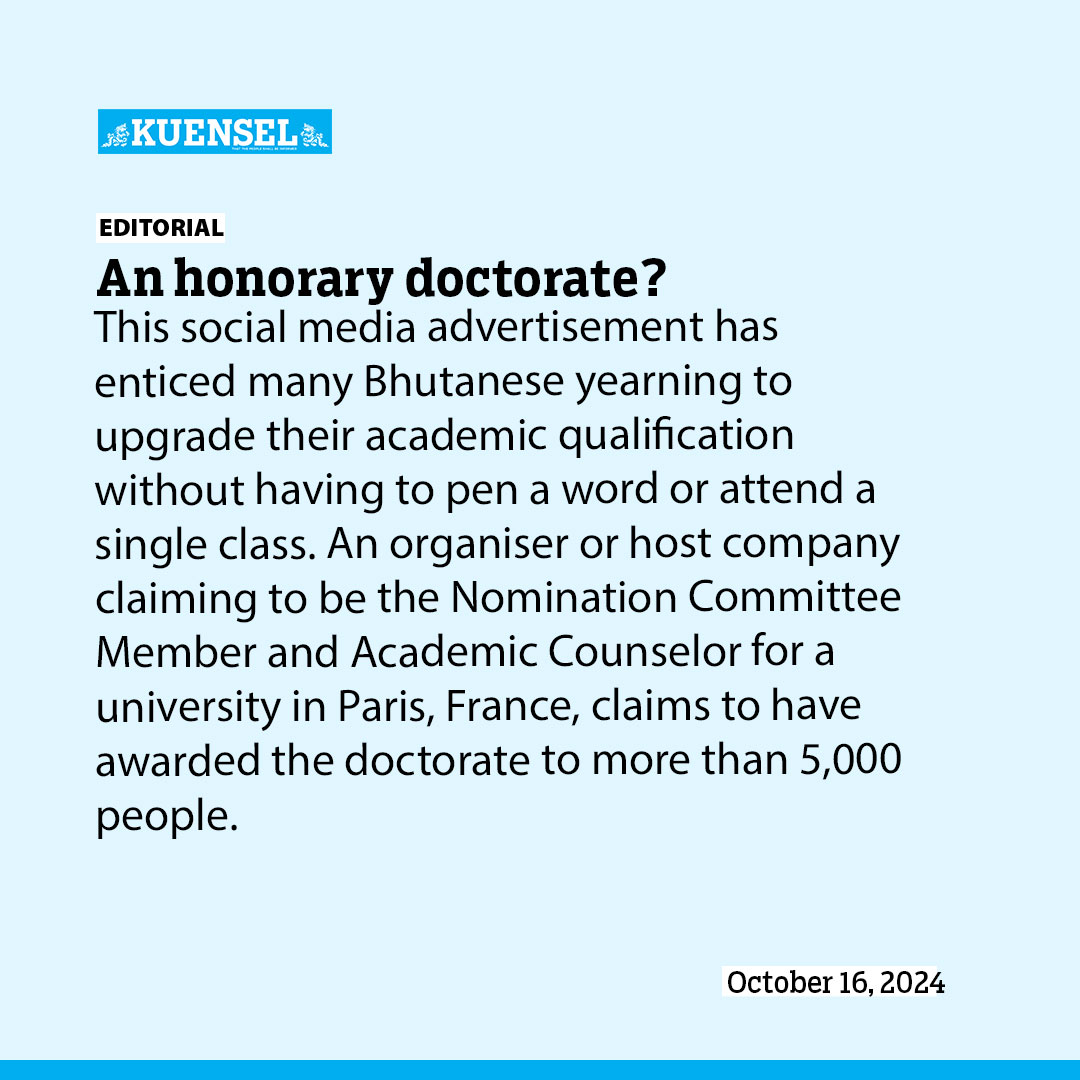“Let us help you achieve the ideal Honorary Doctorate title – Simply share your CV, resume, or work profile…”
This social media advertisement has enticed many Bhutanese yearning to upgrade their academic qualification without having to pen a word or attend a single class. An organiser or host company claiming to be the Nomination Committee Member and Academic Counselor for a university in Paris, France, claims to have awarded the doctorate to more than 5,000 people.
Pretending to be an interested client, Kuensel asked how many Bhutanese had received the award. Their achievement, an Indian CEO said, included more than 10 Bhutanese already. An honorary doctorate is a prestigious recognition awarded by a university to individuals who have made significant contributions to a specific field without the individual having to fulfill the typical requirements for a doctoral degree.
The degrees are usually awarded to prominent figures in arts, sciences, politics, social work, business, or other fields to recognise their accomplishments or philanthropic efforts. However, the recognition is commercialised now. It can be bought at as cheap as USD 1,500 including “three certificates, award memento, graduation attire- gaun (gown) and hat, to be precise, and professional photography and videography.”
If an honorary doctorate is a recognition, acknowledging the recipient’s achievements or contributions to society or to enhance the individual’s reputation, adding to their credibility and social standing, the way we get honoured is questionable, if not worrisome.
The issue is about who and how such an accolade is achieved. We should be aware of these unwonted practices. Many of us are gullible and openly celebrate the accolade not knowing that it is a million dollar business for someone sitting behind a computer in India or Bangkok.
Many Bhutanese have fallen for a number of scams. The conmen ask individuals to pay a fee, usually a few thousand dollars. These conmen do not even know what individuals or business the recipients are involved in. Why should they recommend an administrative manager of a small company an “Honorary Doctorate” for contributing to the nation and society.
While individual certificates of excellence or photographic evidence gathering dust in the living room will not cause damage to the institution or the country, what is concerning is the disinformation or misinformation that is spreading.
In today’s media landscape, individuals and businesses often seek publicity, not necessarily with malicious intent. However, the real issue arises when the public is misled into believing that an individual has received international recognition or that a company has been awarded or voted as the best in its field.
These so-called awards are often nothing more than marketing ploys, designed to manipulate perception. While they may seem like harmless tactics on the surface, the implications are far more troubling. When individuals or businesses, the media, and even public officials knowingly or unknowingly participate in such schemes, they are complicit in deceiving the public. This backdoor approach to recognition undermines trust and tarnishes credibility.
The situation worsens when mainstream media fails to verify the legitimacy of these awards. In a recent case, the organisation to which the recipient belonged went into celebratory overdrive, with festivities at the office and at home. A newspaper even reported the so-called achievement without a second thought, only to retract the story when concerns were raised.
It’s easy to imagine the so-called “award” organisers reveling in the uncritical media coverage, counting their profits while the recipients parade in their gowns and hats. What may seem like a minor embarrassment serves as a critical reminder for authorities and institutions to scrutinise such recognitions more carefully.
In an age where public trust in institutions is fragile, it is imperative for media outlets and officials to exercise greater vigilance. Unverified awards should not be allowed to blur the lines between genuine achievement and empty accolades.


